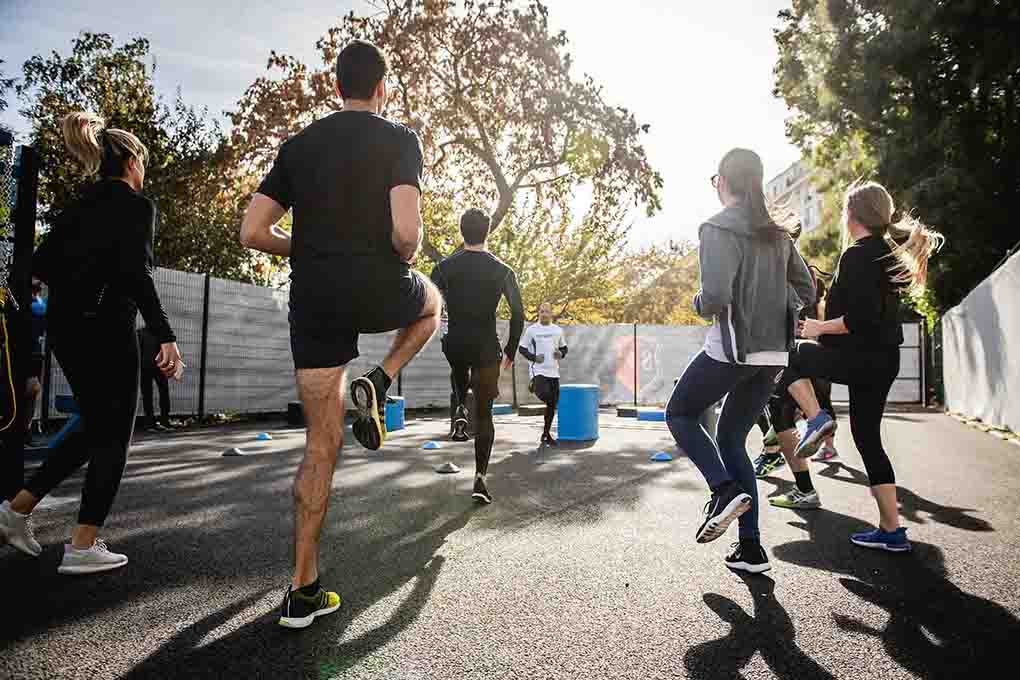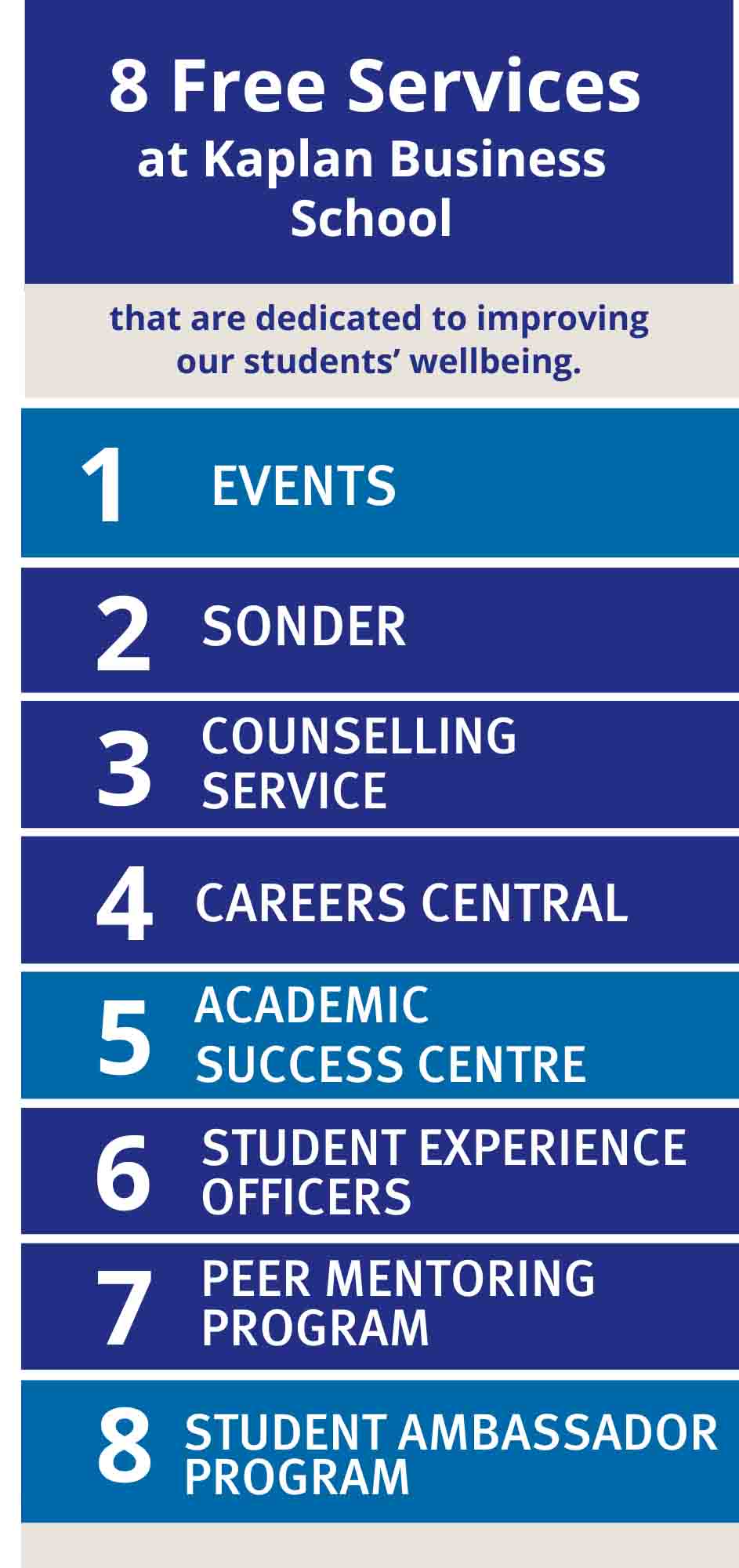Why is wellness important for academic success?
If you are asked “What helps students achieve academic success?” you may answer “Attend lectures and tutorials, read journal articles, start your assignments early or partner with smart students for team projects.” These answers aren’t wrong, but they’re not the complete answer.
Take one step back.
To be able to focus in lectures, energy to complete assignments and exams or be productive on a team project, you first need to have wellness.

What is wellness and why is it important?
Wellness is the ‘active pursuit of activities, choices and lifestyles that lead to a state of holistic health.’
When someone is well it means they are proactively making choices that improve their quality of life. Wellness practices reduce stress and anxiety, giving you the energy and motivation to balance your personal, study and work life to achieve academic success.
The 6 dimensions of wellness
Contrary to popular belief wellness is not just about physical or mental health. The Global Wellness Institute lists 6 dimensions with each delivering different benefits to improve your wellbeing.
1. PHYSICAL
This means:
- Nourishing a body through exercise
- A balanced diet
- Good sleep
The benefits:
Good physical health is important to learning. It improves your cognitive skills such as concentration and memory. Having a healthy body gives you the energy to complete daily tasks at university. You can focus better in lectures and be more productive during group study.
2. MENTAL / INTELLECTUAL
This means:
- Growing intellectually
- Striving for creativity
- Open to new ideas and ways of solving problems
- Valuing lifelong learning
The benefits:
Mental health is needed for planning, reducing stress and making informed decisions. You become motivated to learn and bring fresh new ideas to class discussions. You will be more confident in problem-solving and dealing with challenges.
You will value lifelong learning (e.g. further study, attending industry webinars) to build upon your knowledge and skills to help you achieve your career goals.
3. EMOTIONAL
This means:
- Knowing how we think and feel
- Ability to cope with life events
- Empathetic towards others
- Managing stress
The benefits:
Good emotional health helps you see the best in yourself even in tough times. You’re not judging yourself too harshly, know it’s okay if you make a mistake and learn from them. You can cope with stress during busy periods of the academic year and handle challenges in other areas of your life (e.g. financial stress, balancing work and study).
Being able to empathise will strengthen your friendships and better connect with students from other cultures as you can see things from their perspective.
4. SPIRITUAL
This means:
- Having a set of values and beliefs that gives you purpose and meaning in your life
The benefits:
Engaging in your spiritual side can lead to peace of mind and a sense of calm to help you manage stress and anxiety. You can meditate, journal or self-reflect to gain new insights and remind yourself why you are studying in the first place and to keep going.
You can form a community with people who share the same spiritual values which could lead to healthy lifelong friendships.
5. SOCIAL
This means:
- Connecting with others in meaningful ways
- A sense of belonging
- Respecting others
- Caring for the community
The benefits:
Having friends who accept you and share your opinions is great for your social wellbeing. Talking with advisors and mentors can help you adjust to your new learning environment and culture in Australia.
Attending Networking events allows you to connect with like-minded people who can share their expertise with you. Joining university clubs and meeting people who have the same hobbies and interests as you or volunteering in the local community also boosts social wellness.
6. ENVIRONMENTAL
This means:
- A sense of safety and comfort with your physical surroundings
- Understanding how your habits affect other communities and the planet
- Committing to a healthier planet through sustainable living practices
The benefits:
By changing your habits to make our planet healthier (e.g. using a reusable bottle or cup, recycling) ensures a better quality of life for yourself and others in the present and future. Going outside and appreciating nature will help calm and relax you while you study.
SELF-REFLECTION
There are several dimensions to wellness with each one being equally important to helping you achieve academic success. Review which dimensions you would like to improve in first and make a list of short-term and long-term things you could do.
How Kaplan Business School embraces wellness
There are 8 free services at Kaplan Business School that are dedicated to improving our students’ wellbeing.

1. EVENTS
Wellness Week
During Wellness Week, students take time out of their study and focus on other areas of their wellbeing. They have access to various resources, events and interactive activities. #WellnessatKBS

Kindness Week
Kindness is a mindset and life skill. During Kindness Week, staff and students are encouraged to make positive changes in the world by doing small acts of kindness. #onesmallact
Feedback week
During Feedback Week, students provide feedback about their experience, learning and teaching at KBS. Many of the improvements we make at KBS are a result of the ideas and feedback from our students. #KBSFeedbackWeek
MultiKultural Week
MultiKultural Week celebrates the diversity of our student population (over 90 nationalities). Students learn about each other’s cultural beliefs, values and celebrations. #MultiKulturalWeek
2. SONDER
The Sonder app connects our students with a support team who provide free safety and well-being assistance (e.g. medical needs, mental health issues) at any time of the day and night. They can use Sonder to contact a nurse to help someone who’s injured or talk to a counsellor if they’re feeling stressed.
3. COUNSELLING SERVICE
There are dedicated counsellors that our students can talk to about any challenges or difficulties and explore options to resolve them.
4. CAREERS CENTRAL
Our current students and alumni can talk to the Careers Central team to get the knowledge and skills necessary for a successful career. The team also organise industry speakers, expert panels and networking events.
5. ACADEMIC SUCCESS CENTRE
The Learning Advisors provide help students with skills such as citation and referencing, paraphrasing, researching, essay writing, presentation delivery and proofreading.
6. STUDENT EXPERIENCE OFFICERS
The Student Experience Officers help students settle into life on campus and online. They can answer any questions relating to studying, campus facilities and settling into the Australian education system, culture and community life.
7. PEER MENTORING PROGRAM
The Peer Mentoring Program is about students helping students. New students can receive advice from a current student (mentor) who has been through a similar situation as them. Mentors get to practise their communication and leadership skills and positively impact the lives of others.
8. STUDENT AMBASSADOR PROGRAM
Student Ambassadors have responsibilities such as organising and helping at events such as Orientation and Graduation and creating social content. The program is an opportunity to be a role model and enhance the student experience and community.









